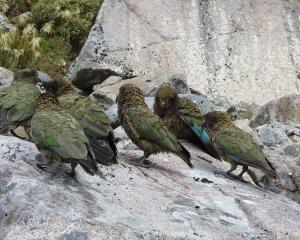In a column in April, I wrote about diversity of thought on boards and asked the question: why on earth do we have no Asian representation on any of our largest agricultural companies when our largest export market is China.
Just as importantly, I should also have asked: where is Maori representation on our largest agricultural export companies, when the Maori economy is worth $42billion and growing?
I was pretty incensed when I read Gerrard Eckhoff's opinion piece (ODT, 18.5.16, New Plymouth's mayor at odds with public) and was relieved when Ian Taylor so eloquently responded (ODT, 30.5.16). At the time, I thought to myself, I don't need to weigh into that debate - well said, Mr Taylor.
Then I read a paper by Michael Ahie, The Rise and Rise of Maori: Iwi and the Agricultural and Food Sector (In: The New Zealand Land and Food Annual) and it occurred to me that the debate itself was wrong.
The discussion should not be about Maori representation within predominantly Pakeha boards and councils, but recognition that the Maori economy has the wherewithal to lead us out of our export commodity trap.
In his paper, Michael Ahie recognises there is huge potential in producing high quality food brands with global appeal, based on intergenerational business models, sustainability and the Maori culture; a combination he describes as a beautiful gift. Maori organisations are using this beautiful gift to develop exciting export opportunities.
Examples include Miraka, a milk processing and exporting company based in Taupo; Kono, a Nelson-Marlborough based company exporting seafood, horticultural and wine products; and Integrated Foods, a lamb exporting business owned by Gisborne-based Mangatu. The success of these companies will be success for all of us; higher return on export products, greater innovation, more jobs, and greater wealth in our regional communities.
Maori culture is important to us all, although here in New Zealand, we sometimes forget that. Funnily enough, I don't know anybody who travels internationally, who isn't proud to roll out Maori culture and song because it is part of who we are as New Zealanders.
I, personally, have given Chinese business people beautiful Maori carvings, in order to protect them and demonstrate my friendship.
Maori culture makes us unique, different from Australia, different from England, Scotland and Ireland. As children, we grow up proudly watching and practising the haka. It's our first port of call to celebrate a gold medal and show that as a country we are one.
I will always remember a story I heard when listening to wealthy American tourists being interviewed on Radio New Zealand. The tourists had seen the best of the very best of New Zealand, eaten our best food, sampled our best wines, stayed in our luxury lodges.
When they were asked "What is your favourite memory of New Zealand?'' they answered, Maori children singing to them, barefoot in Northland.
Maori agricultural organisations are working all this out and are growing better and stronger. They are upskilling and ensuring what they do has long-term benefits for their people and New Zealand as a whole.
If we don't include Maori people in our board circles and recognise how much value they can add, they will do it for themselves, as the formation of Miraka, a competitor to Fonterra, has shown.
Smaller players will partner with larger players and international partnerships will be formed. Don't doubt for a moment that the Maori economy is on the rise.
To see so few Maori representatives on agri-export boards shows to me how lacking in vision we are. This is not a politically correct debate about representation.
It is a debate of sound economic thinking and cultural nous about who we are as a country and how our products reflect this. If our agricultural leaders don't get this, we really are pale, male and stale and we deserve to thrash around like corks on the waves of international commodity prices.
-Anna Campbell is managing director of AbacusBio Ltd, a Dunedin-based agribusiness consulting and new ventures company.












